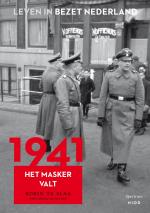1941 Het masker valt
After the February Strike, the Nazis dropped their masks. The Netherlands were to be ‘Nazified’. In their work, leisure time, and in the streets, the Dutch started to experience what life was like in a dictatorship. Thousands of associations and foundations were forced to close down. People’s circumstances were reduced, and many products, such as potatoes, chocolate and cigarettes, were rationed. That year, new anti-Jewish measures followed in rapid succession. In the course of 1941, Jews were excluded from all areas of society. Social isolation was the first step towards deportation.
Robin te Slaa (1969) is a historian and publicist. He has written articles on history for a variety of newspapers, magazines, and books. In 2009, Te Slaa published De NSB. Ontstaan en opkomst van de Nationaal-Socialistische Beweging, 1931-1935 (The NSB. Inception and Rise of the National-Socialist Movement, 1931-1935) with Edwin Klijn. The book received favourable reviews and was nominated for the shortlist of the Dutch Libris History Prize. In 2012, his book Is Wilders een fascist? (Is Wilders a Fascist?) was published, which was also well received.
‘Te Slaa uses seemingly small anecdotes to illustrate big events' **** - NRC Handelsblad
Robin te Slaa
